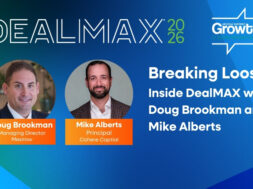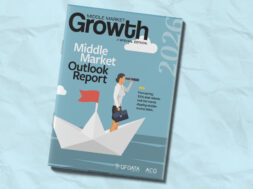U.S. Economic Outlook, Family Offices and PE-Backed Companies: Day One of the ACG Fall Summit
The first day of ACG's Fall Summit focused on the economic fallout of the elections, partnering with family offices and managing PE-backed companies.

Thanks to the one-two punch of the COVID-19 pandemic and the recession that followed, the U.S. economy suffered a steeper drop in GDP and greater job losses than the Great Recession of 2008. As some sectors have stumbled—such as manufacturing, travel, dining and housing sales—others like housing starts appear to be faring well, according to Gus Faucher, senior vice president and chief economist of PNC Financial Services Group, during the opening session of the ACG Fall Summit.
“We have a long way to go before the economy gets back to normal,” Faucher said. He added that stock market volatility will remain high until uncertainties around the coronavirus and last week’s federal elections—specifically the outcome of two Senate runoff races in Georgia—are smoothed out.
Check out Day Two of the ACG Fall Summit panel sessions.
Despite this challenging news, the rapid economic recovery we’ve seen since the spring is due in large part to the stimulus programs implemented by the federal government, Faucher said.
While Faucher expects another round of stimulus from Congress, he doesn’t predict any large tax increase on businesses or high earners from the coming Biden administration. “In fact, we might see tax cuts if that’s what’s needed for Biden to get the GOP on board for stimulus,” he said.
Despite reports on Monday that pharmaceutical giant Pfizer has developed a vaccine for the coronavirus, along with a subsequent jump in the stock market, the U.S. economy still has many vulnerabilities. One slide of Faucher’s presentation showed that a sizable portion of businesses don’t believe they can continue in the next six months if current economic conditions continue.
“Businesses need another boost and it is important that Congress provide another stimulus while a new vaccine is introduced and people can go back to work. We need to provide stimulus during the vaccine creation and distribution process,” he said.
The Family Office Challenge
Family offices are changing how they do business in order to adapt to the COVID-19 landscape. This requires embracing new business methods while retaining their core values.
Family offices are famously idiosyncratic, said Elizabeth Browne, head of entrepreneur and family office partnerships at RedBird Capital, in the afternoon panel session, “Collaborative Investing—Partnering with Other Families, PE and Independent Sponsors.” She added that many families are developing their own in-house investment initiatives.
Family offices want their investments to mirror their existing expertise, Browne said. In another macro trend, family offices are moving toward specialization, including in areas like health care and manufacturing, she added.
This trend may lead specialized family offices with the same focus to work together, but Nick Cimino, head of private investments and alternative credit at PNC Asset Management Group, said that isn’t occurring frequently.
Sasha Bernier, senior vice president and investment committee member at family office Cheltenham Investments, said before his firm enters into co-investments, he looks at the track record of partners. He adds that this is not complicated because of the lack of players in the field.
PE-Backed Execs Share COVID Survival Secrets
In the early spring of 2020 when the national lockdown began in the U.S., PE-backed companies worked closely with their investors as they moved into high gear to get through the crisis.
For Simplura Health Group, a senior care facilities management firm, liquidity was a concern at the start of the pandemic. “We drew down new lines of credit because there was fear that the credit markets would seize up. Our backers were a help here because they had good relations with our lenders. They were another voice in those conversations,” said Jim Caruso, chief financial officer for Simplura during the ACG Fall Summit panel titled “Leading a PE-Backed Company into a Post-Pandemic World.”
Lockdown came at an inopportune time for Simplura, which was working on a transaction. He said the company had to pause the deal and concentrate on operational risk when the government declared a national emergency.
Communication with other businesses within its investor’s portfolio was key for Office Practicum, a software-as-a-service company that serves pediatric offices, as it navigated the pandemic this year.
“We asked what other portfolio companies were doing and we held monthly meetings with other CFOs to share best practices. We hadn’t done that before COVID but it gained momentum and we benefited from it,” said Ellen Purdy, CFO for Office Practicum.
Purdy’s company also benefited from its private equity owner’s guidance and relationships. Office Practicum’s backers helped it navigate the process of borrowing through the Paycheck Protection Program, after the company qualified for a loan. “Our backers helped us make the case, so we borrowed and three weeks later we paid it back, every penny of it,” she said.
Portadam, a flooding solution provider, also qualified for a PPP loan. “One of the key roles of our backers was providing information, especially in the early phase. Our backers were very helpful with aggregating information and filtering it out and distributing it out, and helping us see through the way to pay that loan,” said Jyothish Daniel, CEO of Portadam.
Communication up the chain to the PE company was paramount to John F. Beering, president of United Access LLC, a wheelchair and mobility solution provider that is part of Arch Channel Retail LLC.
His company met weekly with its PE owners. “We are part of a private equity group that [invests for the] long haul, and they were clear that they were not going to let us fail. They made sure we had access to cash and liquidity, because the first few months [of the pandemic] we were burning through cash,” he said.
He added, “We are now cash positive and we are ready for the next ride on the roller coaster, which we think we are in.”

Phil Albinus is Middle Market Growth’s managing editor.


